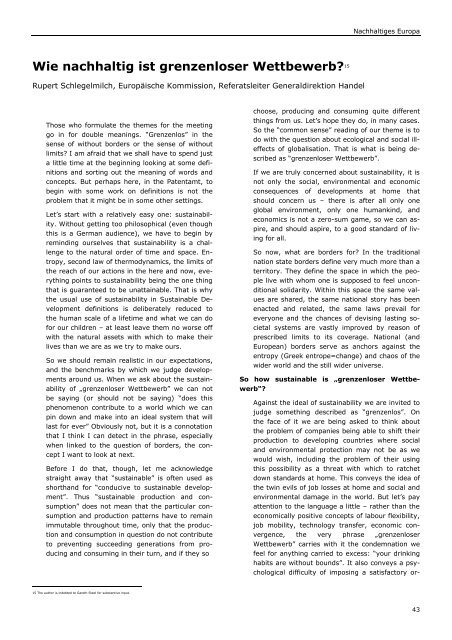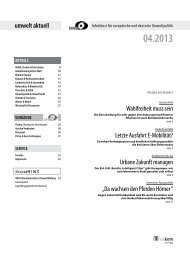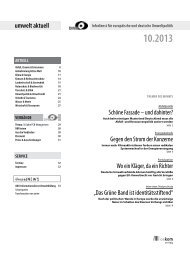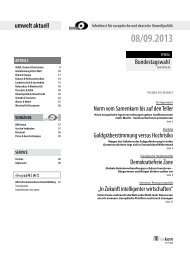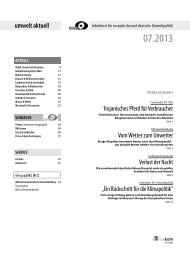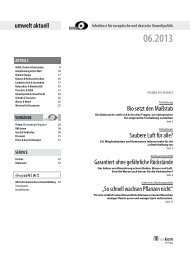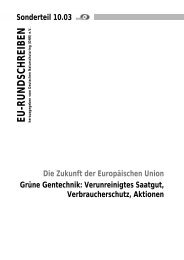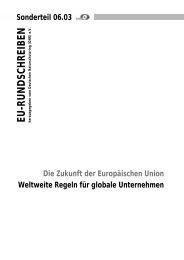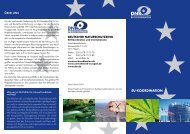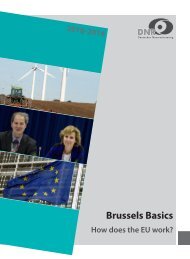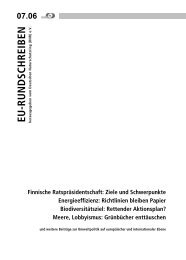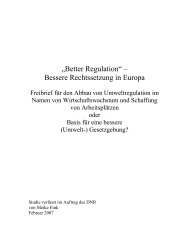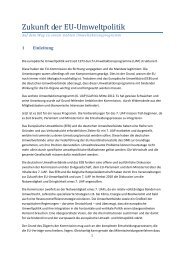Nachhaltiges Europa Abschlusspublikation - Global Marshall Plan
Nachhaltiges Europa Abschlusspublikation - Global Marshall Plan
Nachhaltiges Europa Abschlusspublikation - Global Marshall Plan
Erfolgreiche ePaper selbst erstellen
Machen Sie aus Ihren PDF Publikationen ein blätterbares Flipbook mit unserer einzigartigen Google optimierten e-Paper Software.
Wie nachhaltig ist grenzenloser Wettbewerb? 15<br />
Rupert Schlegelmilch, Europäische Kommission, Referatsleiter Generaldirektion Handel<br />
Those who formulate the themes for the meeting<br />
go in for double meanings. “Grenzenlos” in the<br />
sense of without borders or the sense of without<br />
limits? I am afraid that we shall have to spend just<br />
a little time at the beginning looking at some definitions<br />
and sorting out the meaning of words and<br />
concepts. But perhaps here, in the Patentamt, to<br />
begin with some work on definitions is not the<br />
problem that it might be in some other settings.<br />
Let’s start with a relatively easy one: sustainabil-<br />
ity. Without getting too philosophical (even though<br />
this is a German audience), we have to begin by<br />
reminding ourselves that sustainability is a challenge<br />
to the natural order of time and space. En-<br />
tropy, second law of thermodynamics, the limits of<br />
the reach of our actions in the here and now, everything<br />
points to sustainability being the one thing<br />
that is guaranteed to be unattainable. That is why<br />
the usual use of sustainability in Sustainable Development<br />
definitions is deliberately reduced to<br />
the human scale of a lifetime and what we can do<br />
for our children – at least leave them no worse off<br />
with the natural assets with which to make their<br />
lives than we are as we try to make ours.<br />
So we should remain realistic in our expectations,<br />
and the benchmarks by which we judge developments<br />
around us. When we ask about the sustain-<br />
ability of „grenzenloser Wettbewerb” we can not<br />
be saying (or should not be saying) “does this<br />
phenomenon contribute to a world which we can<br />
pin down and make into an ideal system that will<br />
last for ever” Obviously not, but it is a connotation<br />
that I think I can detect in the phrase, especially<br />
when linked to the question of borders, the concept<br />
I want to look at next.<br />
Before I do that, though, let me acknowledge<br />
straight away that “sustainable” is often used as<br />
shorthand for “conducive to sustainable development”.<br />
Thus “sustainable production and consumption”<br />
does not mean that the particular con-<br />
sumption and production patterns have to remain<br />
immutable throughout time, only that the production<br />
and consumption in question do not contribute<br />
to preventing succeeding generations from producing<br />
and consuming in their turn, and if they so<br />
15 The author is indebted to Gareth Steel for substantive input.<br />
<strong>Nachhaltiges</strong> <strong>Europa</strong><br />
choose, producing and consuming quite different<br />
things from us. Let’s hope they do, in many cases.<br />
So the “common sense” reading of our theme is to<br />
do with the question about ecological and social illeffects<br />
of globalisation. That is what is being de-<br />
scribed as “grenzenloser Wettbewerb”.<br />
If we are truly concerned about sustainability, it is<br />
not only the social, environmental and economic<br />
consequences of developments at home that<br />
should concern us – there is after all only one<br />
global environment, only one humankind, and<br />
economics is not a zero-sum game, so we can aspire,<br />
and should aspire, to a good standard of living<br />
for all.<br />
So now, what are borders for? In the traditional<br />
nation state borders define very much more than a<br />
territory. They define the space in which the people<br />
live with whom one is supposed to feel uncon-<br />
ditional solidarity. Within this space the same values<br />
are shared, the same national story has been<br />
enacted and related, the same laws prevail for<br />
everyone and the chances of devising lasting societal<br />
systems are vastly improved by reason of<br />
prescribed limits to its coverage. National (and<br />
European) borders serve as anchors against the<br />
entropy (Greek entrope=change) and chaos of the<br />
wider world and the still wider universe.<br />
So how sustainable is „grenzenloser Wettbe-<br />
werb“?<br />
Against the ideal of sustainability we are invited to<br />
judge something described as “grenzenlos”. On<br />
the face of it we are being asked to think about<br />
the problem of companies being able to shift their<br />
production to developing countries where social<br />
and environmental protection may not be as we<br />
would wish, including the problem of their using<br />
this possibility as a threat with which to ratchet<br />
down standards at home. This conveys the idea of<br />
the twin evils of job losses at home and social and<br />
environmental damage in the world. But let’s pay<br />
attention to the language a little – rather than the<br />
economically positive concepts of labour flexibility,<br />
job mobility, technology transfer, economic convergence,<br />
the very phrase „grenzenloser<br />
Wettbewerb” carries with it the condemnation we<br />
feel for anything carried to excess: “your drinking<br />
habits are without bounds”. It also conveys a psy-<br />
chological difficulty of imposing a satisfactory or-<br />
43


